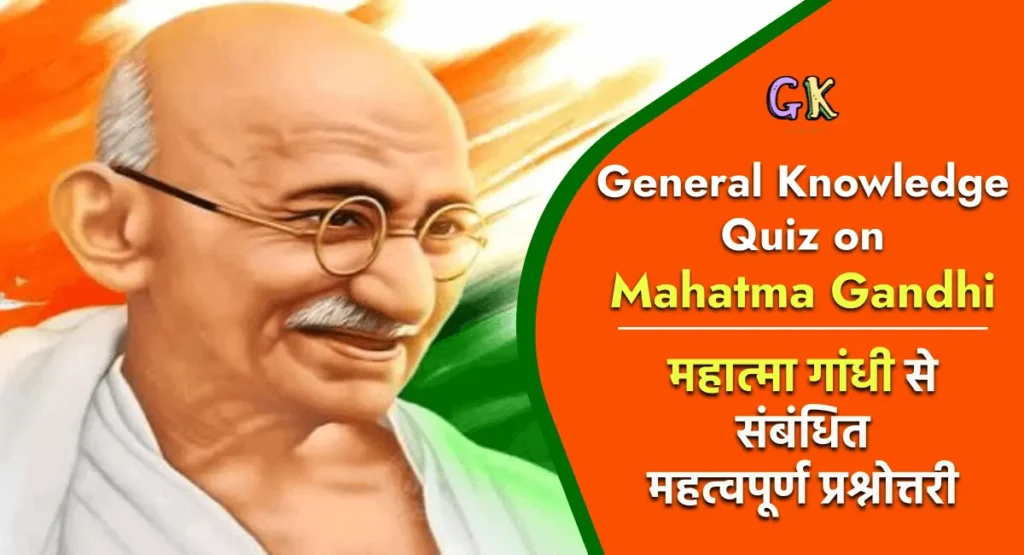Mahatma Gandhi, often called the “Father of the Nation” in India, was a remarkable leader in the country’s fight for independence. He advocated for non-violent resistance to injustice and played a pivotal role in achieving India’s freedom from British rule. To honour his legacy and help others learn about his life and principles, we’ve created a quiz related to Mahatma Gandhi in this article. It’s a great opportunity to test your knowledge and gain insights into the life of this iconic leader.

General Knowledge Quiz on Mahatma Gandhi
Mahatma Gandhi was known for his remarkable wisdom and sharp intellect. He played a crucial role in India’s journey to independence by leading powerful movements such as the Salt March and Quit India Movement. His dedication to non-violence and civil disobedience inspired millions and ultimately contributed to India’s liberation from British colonial rule. Gandhi’s legacy remains an enduring symbol of peaceful resistance and social change.
Following we have prepared a quiz on Mahatma Gandhi containing all the essential questions about him. The objective of this quiz is to self-access and help people learn something new through this fun activity.
[–MCQ-QUESTIONS-DISPLAY–]
About Mahatma Gandhi
Mohandas Karamchand Gandhi, popularly known as Mahatma Gandhi or simply Gandhi, was one of the most revered figures in the world history of the 20th century. Born on October 2, 1869, in Porbandar, a coastal town in Gujarat, India, Gandhi’s life journey would ultimately lead to him becoming an iconic leader in the fight for India’s independence and a global symbol of non-violence and civil disobedience.
Gandhi’s early years were relatively ordinary. He came from a devout Hindu family and was married at the age of 13 to Kasturba Gandhi. In 1888, he traveled to London to study law and eventually became a barrister. His time in London exposed him to Western political thought and philosophy, igniting his interest in social and political issues.
Gandhi’s transformative journey began when he accepted a job in South Africa in 1893. It was in South Africa where he first encountered the deeply ingrained racism and discrimination against Indians. These experiences ignited his passion for justice and equality, setting him on the path of activism.
In South Africa, Gandhi quickly emerged as a leader in the Indian community. He organized campaigns and protests against discriminatory laws such as the infamous Asiatic Registration Act. It was during this time that he developed his philosophy of non-violence, which he called Satyagraha, meaning “truth force” or “soul force.” Satyagraha became the cornerstone of his life’s work.
Gandhi returned to India in 1915, and his arrival coincided with the burgeoning Indian independence movement. His charisma, moral authority, and unwavering commitment to non-violence made him a prominent figure in the struggle against British colonial rule.
One of Gandhi’s most significant contributions was the Salt March in 1930. In protest of the British salt monopoly, he led a 240-mile march to the Arabian Sea, where he and his followers made their salt by evaporating seawater. This act of civil disobedience inspired millions and drew international attention, symbolizing the power of peaceful resistance.
Throughout his life, Gandhi undertook numerous hunger strikes and fasts as a form of non-violent protest. One of the most notable was his fast unto death in 1932, which led to the signing of the Poona Pact, ensuring political representation for the oppressed Dalit community in India.
Gandhi’s commitment to communal harmony and religious tolerance was exemplified in his efforts during the communal violence that erupted after India gained independence in 1947. He embarked on a fast to the death to promote peace and unity among Hindus and Muslims, ultimately preventing further bloodshed.
Tragically, on January 30, 1948, Mahatma Gandhi was assassinated by Nathuram Godse, a Hindu nationalist who disagreed with Gandhi’s views on non-violence and religious harmony. His death sent shockwaves around the world, and he is remembered as a martyr for peace and freedom.
Gandhi’s legacy extends far beyond India’s struggle for independence. His philosophy of non-violence and civil disobedience has influenced countless movements for social justice and freedom worldwide, including the American Civil Rights Movement led by Martin Luther King Jr. and the anti-apartheid struggle in South Africa.





